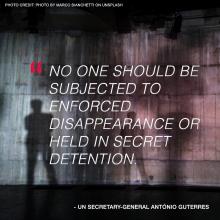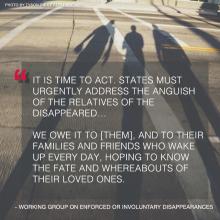Civil society call to end enforced disappearances in China
On the International Day of the Disappeared, the international community must recognize and respond to the widespread use of enforced disappearances in the People’s Republic of China.
Just over five years ago, on 13 August 2017, human rights lawyer Gao Zhisheng vanished for the third time. Gao, praised as the ‘Conscience of China’, had long fought for the rights of those who dared to speak out, who belonged to religious minorities, who were evicted from their homes when their land was seized, or who protested against exploitation. For that, he was in and out of prison and separated from his family for nearly a decade. For more than five years, his wife and daughter have had no idea of his whereabouts, nor even if he is alive.

Gao Zhisheng’s case is severe, and yet represents only the tip of the iceberg: many other activists and lawyers face a similar fate, such as Tang Jitian, disappeared in 2021, tortured, and detained in a secret location. UN experts, including the Working Group on enforced disappearance, have sounded the alarm from as early as 2011 about the use of enforced disappearances against those taking part in China’s human rights movement. It is used to silence those promoting rights and freedoms, to enable acts of torture and ill-treatment without any oversight, and to send a chilling message to any person who may dare to criticize the government.
The UN Secretary-General Antonio Guterres echoed this when he reminded the international community that enforced disappearance is a ‘method of repression, terror, and stifling dissent’. Relatives – themselves also victims of this crime – are deprived of their right to justice, and to know the truth, constituting a form of cruel and inhumane treatment for the immediate family.

But no matter how powerful a country is, no matter what security challenges (real or perceived) they may face, the experts rightfully emphasize: ‘There can never be an excuse to disappear people.’ Enforced disappearances are strictly prohibited under international law under any circumstances, and may constitute a crime against humanity when committed as part of a widespread or systematic attack against any civilian population.
The Chinese government continues to ignore calls for it to ratify the International Convention for the Protection of All Persons from Enforced Disappearance. It has disregarded requests for over nine years by the UN’s Working Group on Enforced and Involuntary Disappearances to visit the country, including its most recent on 7 January 2022. In the meantime, the number of cases of individuals disappeared presented before the Working Group soared, reaching 214 by 2021, out of which 98 remain outstanding.
It is urgent that the UN, governments, and civil society worldwide press China to end, unequivocally, all forms of enforced disappearance.
UN experts and civil society actors have documented many practices used by the Chinese authorities amounting to enforced disappearance. Some are written into Chinese law, or Chinese Communist Party guidance; others happen outside the scope of China’s own laws. Some target individuals for their actions or speech; others are wielded with the intent to terrorize a particular ethnic or religious community.
Residential Surveillance at a Designated Locations (RSDL)
‘Residential Surveillance at a Designated Location’ is allowed for in China’s Criminal Procedure Law, and authorizes holding someone in custody – prior to arrest – for up to six months in an undisclosed location. This ‘location’ is unofficial, selected at the discretion of the police, and the individual is isolated in solitary confinement without access to family, counsel or options to appeal the measure. This is especially true for those activists and dissidents accused of ‘national security crimes’. Incomplete government data admits to use of RSDL in some 23,700 instances, but civil society estimates that for the period 2013 to 2021, the real figure is closer to 85,000, with increased use over time. The practice continues despite having been condemned by UN experts as ‘a form of enforced disappearance’ that ‘may per se amount to cruel, inhuman or degrading treatment or punishment, or even torture.’ The experts’ assessment is clear: RSDL must be repealed.
Liuzhi system
The liuzhi (留置) extralegal detention system mimics the practice of RSDL, but is used to specifically punish any public servant or Chinese Communist Party (CCP) member who allegedly ‘violates duties’ or commits ‘economic crimes,’ potentially reaching nearly 300 million victims. As with RSDL, liuzhi detentions can last up to six months, holding victims incommunicado and in solitary confinement at undisclosed locations. Yet, detentions are outside the scope of China’s laws, including the Criminal Procedure Law, as liuzhi is not part of the criminal justice system. Instead, it is run by China’s powerful extra-judicial anti-graft watchdog, the National Supervision Commission (NSC), a quasi-state body answerable only to the CCP. Legal safeguards, including the right to legal counsel, do not apply to individuals investigated under liuzhi, until and unless their case is sent for criminal prosecution. Incomplete official data acknowledges 11,000 individuals held under liuzhi; civil society estimates actual figures to surpass 57,000 disappeared victims. UN experts addressed a general allegation on this issue to China in September 2019.
Psychiatric incarceration (ankang)
Since the 1980s, China’s Ministry of Public Security has locked up individuals targeted for their political and religious beliefs in psychiatric hospitals for the criminally insane, known as ankang (安康) (‘peace and health’). Despite legal reforms, police continue to send human rights defenders for compulsory treatment without medical justification in both ankang facilities, and psychiatric hospitals for the general public. Civil society data indicates this is a regular, large-scale practice, where victims are denied contact with the outside world and often subjected to torture and ill-treatment, while families are not informed about their relatives’ forced hospitalization.
Enforced disappearance in Tibet
The Chinese authorities continue to disappear Tibetans, including religious leaders, critics and influential thinkers, subjecting them to torture and ill-treatment, and employing the threat of disappearance to instill widespread fear across Tibet. In February 2022, six UN experts raised concern over the physical well-being of Tibetan musician Lhundrup Drakpa, writer Lobsang Lhundrub, and school teacher Rinchen Kyi, arrested and disappeared ‘in connection with their cultural activities in favour of the Tibetan minority language and culture.’ In July 2021, four UN experts expressed similar concern over the enforced disappearance of Rinchen Tsultrim and Go Sherab Gyatso, pointing to a ‘worrying pattern of arbitrary and incommunicado detentions (…) against the Tibetan religious minority, some of them amounting to enforced disappearances.’
The 11th Panchen Lama, Gedhun Choekyi Nyima, one of the most important Tibetan Buddhist leaders, was disappeared in 1995 at the age of six. The Chinese government continues to ignore calls for his release, UN experts’ concerns, or the UN child rights committee’s request for access to establish his whereabouts and health.
Enforced disappearance in the Uyghur region
Beginning in 2017 in the Xinjiang Uyghur Autonomous Region (XUAR, or Uyghur Region), Uyghurs and Turkic Muslims have been detained incommunicado by Chinese government officials in internment camps, forced labor facilities, official prisons where they serve lengthy sentences, and other facilities where they are at risk of being subject to forced labor. Reports to the UN Working Group on enforced disappearances escalated dramatically, indicating a widespread and systematic practice. While the Chinese government refers to these camps as ‘vocational education and training centers’, administrative detention in the camps has no basis in Chinese, or international law.
Journalists and NGOs have reported countless testimonies of people whose family members are or were missing and believed to be detained in the XUAR, and yet who have no way to establish their family members’ whereabouts. They almost never receive official confirmation regarding their family member’s status from the Chinese authorities; efforts to gather information from Chinese consulates or embassies abroad have been largely unsuccessful. Very few detainees are allowed contact with the outside world. Even nominally ‘free’ Uyghurs living in XUAR have been effectively forbidden to speak with their family or friends abroad. Uyghurs in the country and overseas are wholly deprived of their right to truth.
We, the undersigned organizations, urge the international community as a whole to ensure sustained attention and take meaningful action to put an end to all forms of enforced disappearance in China. The authorities must release all those disappeared, ensure their relatives’ right to truth, justice, reparation, and guarantees of non-recurrence.
We stand in solidarity with all those missing, and with their loved ones, left longing for them to return alive.
Signatories:
- Amnesty International
- China Against the Death Penalty
- ChinaAid
- Chinese Human Rights Defenders
- Front Line Defenders
- Global Centre for the Responsibility to Protect
- Grupo de Apoio ao Tibete Portugal
- Hongkongers in Britain
- Hong Kong Watch
- International Bar Association’s Human Rights Institute (IBAHRI)
- International Campaign for Tibet
- International Commission of Jurists
- International Service for Human Rights (ISHR)
- International Society for Human Rights
- International Tibet Network
- Lawyers for Lawyers
- Lawyers’ Rights Watch Canada
- Northern California Hong Kong Club
- Objectif Tibet, Sciez, France
- PEN America
- Safeguard Defenders
- The Rights Practice
- The 29 Principles
- Tibet Initiative Deutschland
- Tibet Justice Center
- Tibet Support Group Ireland
- Students for a Free Tibet
- Swiss Tibetan Friendship Association
- Uyghur Human Rights Project
- World Organisation Against Torture (OMCT)
- World Uyghur Congress